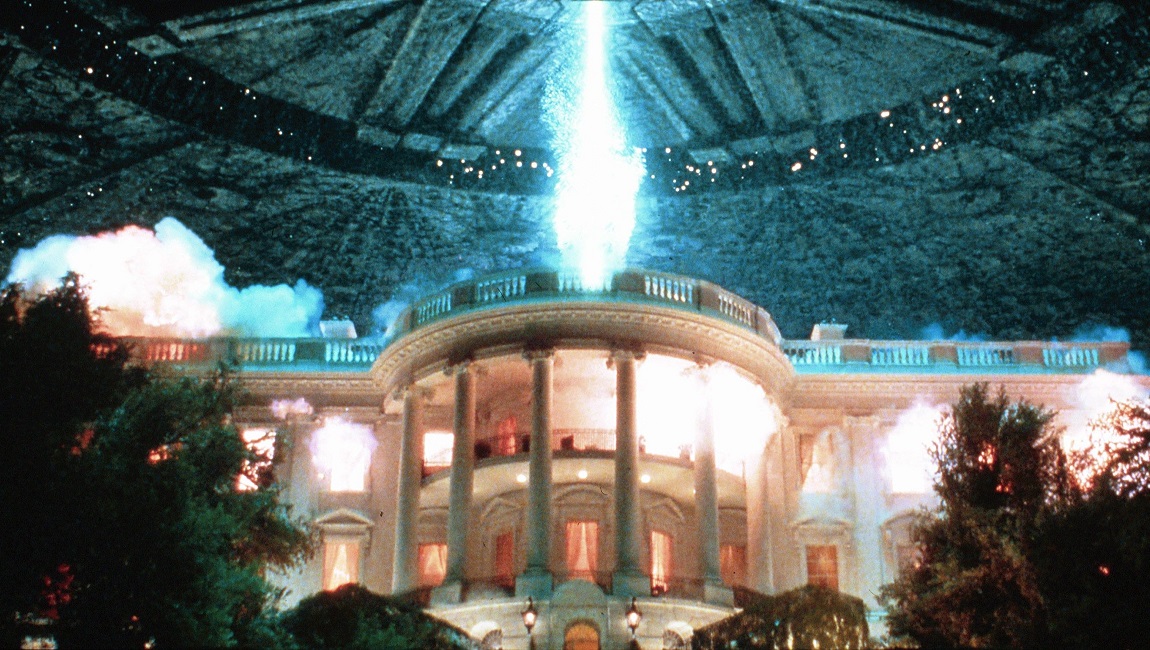The summer of 1996 saw the release of three huge blockbusters that would in one way or another influence the next 20 odd years of Hollywood filmmaking. Twister revived the moribund eco-disaster picture, while Mission: Impossible gave global superstar Tom Cruise his very own (ongoing) action franchise. The third title was Independence Day, an alien invasion sci-fi adventure flick that, like Twister, evoked the structure of the 70s disaster film, amplified with cutting edge special effects. Of the three, Independence Day was the biggest hit, making almost $900 million worldwide in unadjusted dollars. Released before the Chinese market emerged as a major secondary source of film profit-padding, this level of gross was virtually unprecedented. It was a monstrous hit, in other words, catapulting director Roland Emmerich into the upper echelons of Hollywood blockbuster power players and marking the birth of a new A-list movie star in Will Smith. For people of a certain age, this was an era-defining film. It’s not a good film, necessarily, but thanks to slick direction and a winning cast, it’s very watchable, a quality that surely helped it move somewhere in the neighborhood of 20 million copies on VHS. It also undoubtedly warped an entire generation’s mind with the spurious myth of American exceptionalism. Independence Day is American solipsism at its most maddening.
With the Cold War over and the specter of that boogeyman communism all but vanquished in America, Emmerich, along with co-writer and producing partner Dean Devlin, cribbed clichés from old 40s and 50s sci-fi flicks, stripping them of their subtext, and hodgepodged them with elements of Golden Age WWII movies (but only the ones that were uncomplicatedly pro-America, naturally). Like any disaster picture you care to name, Independence Day has a very specific structure (one that Emmerich would mercilessly beat into the ground with his subsequent films). First, it takes its time introducing each of the major players: Jeff Goldblum’s fidgety, nervous scientist, Will Smith’s cocky fighter-pilot, Bill Pullman’s put-upon US president, and a bunch of supporting players that exist for comic relief or to perform their duty as casualties at hands of the invaders. The various narrative strands eventually coalesce around the initial attack, ridding the film of excess characters, before it starts all over again, this time building up to an eventual counter-attack. It’s fairly economical storytelling, brisk enough that it’s never boring even when you’re just waiting for the attack to finally commence. The film is all narrative beats and moments between beats, and as Dennis Lim once argued, Emmerich doesn’t have “any discernible interest in humans.” That might be a bit harsh, but certainly Emmerich cannot conceive of a character who manifests as anything more than a type. Indeed, every actor in Independence Day seems to be in a different movie, with cornball humor butting up against stoic, tough guy nonsense and pseudo-inspiring speechifying. It’s a testament to the charisma of stars Jeff Goldblum, still hot from the wild success of Jurassic Park three years prior, and especially Will Smith that these people are not only watchable, but actually manage to come off as something close to charming.
With the Cold War over and the specter of that boogeyman communism all but vanquished in America, Emmerich, along with co-writer and producing partner Dean Devlin, cribbed clichés from old 40s and 50s sci-fi flicks, stripping them of their subtext, and hodgepodged them with elements of Golden Age WWII movies.
Once the invasion starts, Emmerich is allowed to get to what he really cares about – destroying iconic buildings in elaborate ways. Independence Day will always have a place in cinema’s history books for its most famous scene, the destruction of the White House. It’s almost orgasmic, a truly bipartisan bit of showmanship that orchestrates the destruction of a national symbol, before spending the rest of the movie proving that America doesn’t need symbols, just men of action. As J. Hoberman has written, “In old-school disaster films, nature was the terrorist. And while greedy, mendacious, or foolish individuals might be at fault, the system was essentially sound and sufficiently internalized to allow a natural leader to emerge from the chaos, often in uniform.” He’s speaking generally, but he might as well be writing about Independence Day specifically, so closely does the film follow this formulation. Indeed, Bill Pullman’s president also happens to be a former soldier, allowing him to take on the mantle of a true commander-in-chief, no bone spurs of dereliction of duty for our president.
The film’s other recognizably iconic scene features Bill Pullman’s public address to rally the troops, declaring that the 4th of July is no longer just an American holiday, but now stands for liberation for the entire world. It’s almost comforting, in a stupid, jingoistic kind of way, that a namby pamby, weak-willed president with low approval ratings finds his balls and inspires the world. It’s a comforting lie, and one that doesn’t sit well after years of unending conflict in the Middle East. In this way, in a very real sense, Independence Day is a key pre-9/11 text. No movie featuring destruction on such a massive scale could be released post-9/11 without directly or indirectly recalling that specific event. Spielberg’s War of the Worlds is, in many ways, the anti-Independence Day, a film haunted by photorealistic depictions of people turning into dust. Emmerich’s film is painless, designed to make ruination go down as smoothly as possible while reassuring us that the world can be rebuilt exactly as it was before. Spielberg’s movie is more reflective of surviving a traumatic experience and the resultant struggle of coming to terms with such seismic collapse (one of the reasons that Spielberg’s feel-good ending still rankles after all these years). Independence Day is the equivalent of playing the national anthem before a sporting event – momentarily rousing according to conditioned response but ultimately pointless, a grandstanding, pompous bit of rah-rah bullshit spectacle.
Part of Kicking the Canon – The Film Canon.







